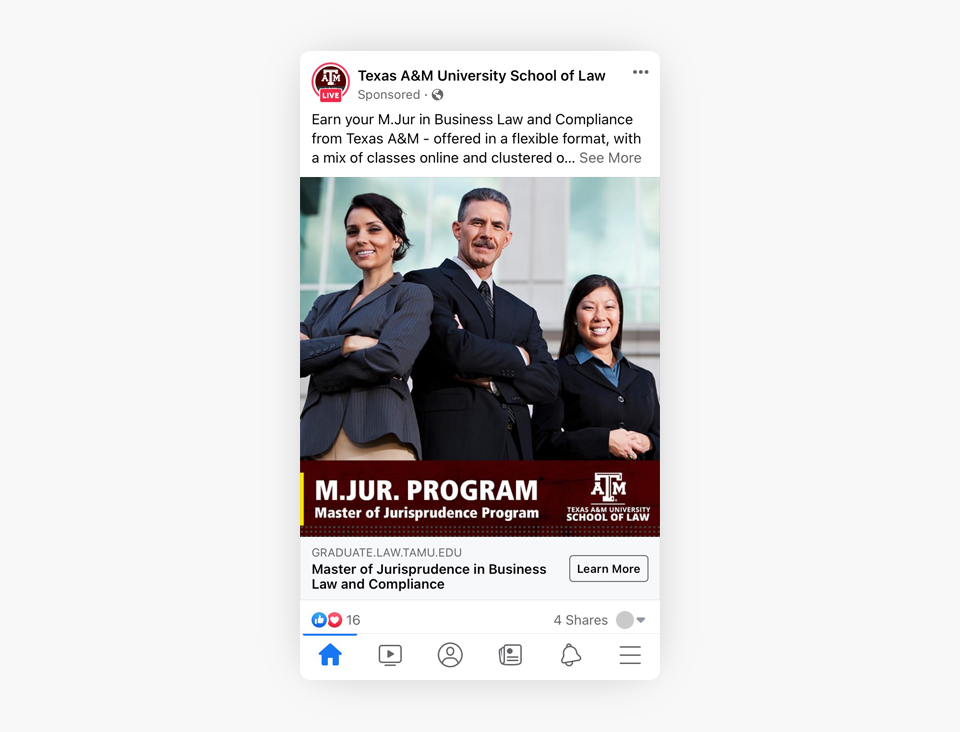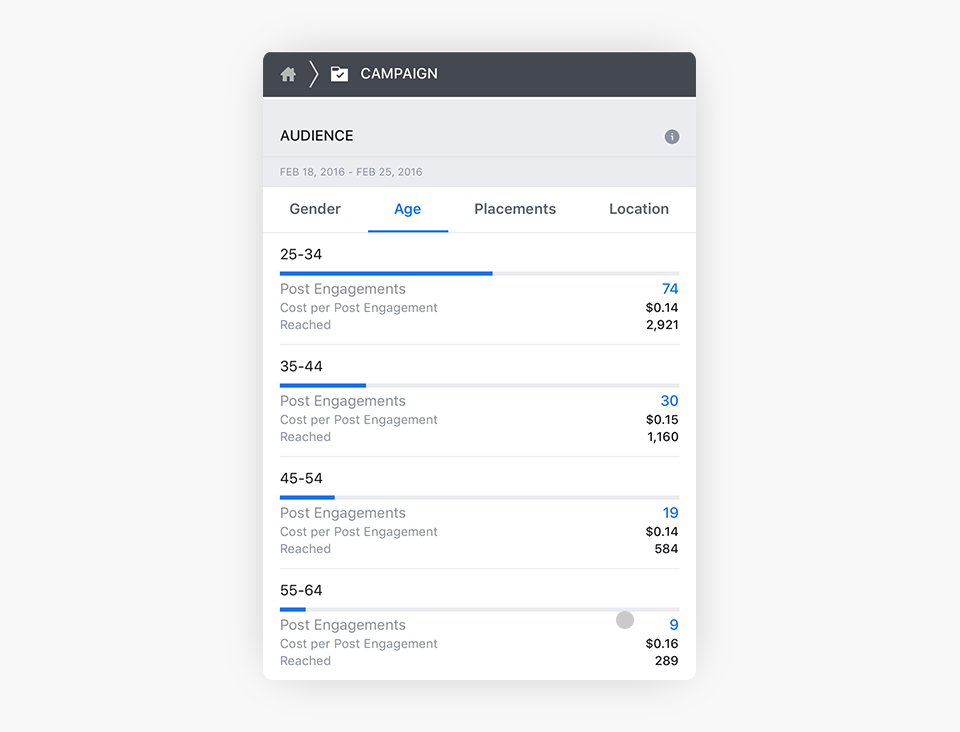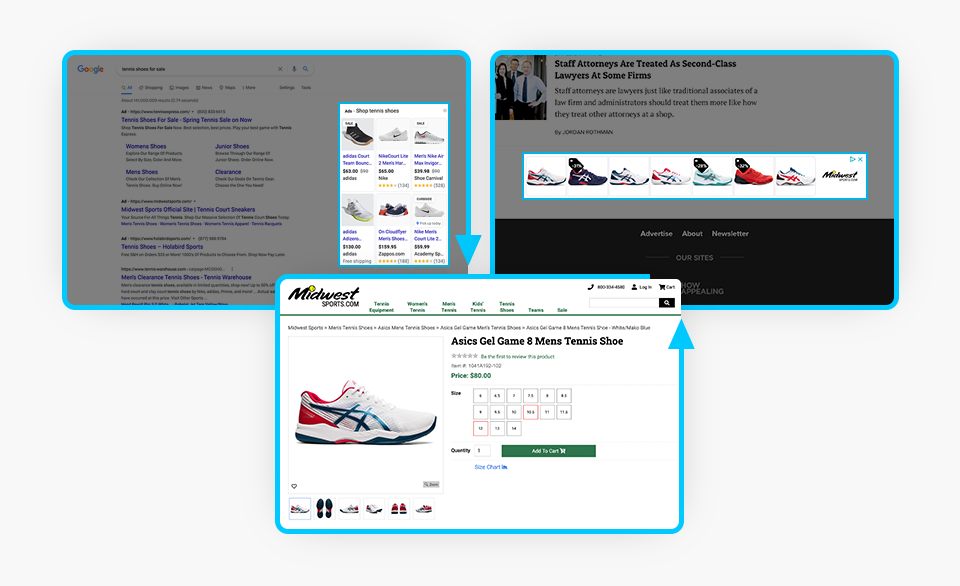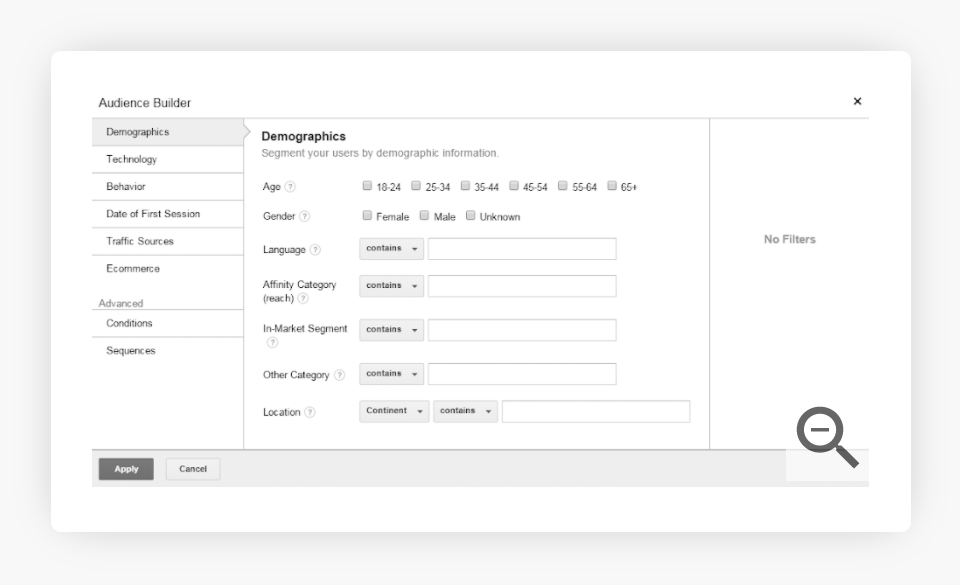We can’t send you updates from Justia Onward without your email.
Unsubscribe at any time.
If you need a quick comparison of the usefulness of Facebook and Google’s remarketing products for a law firm, or simply need a quick introduction to some things to consider when it comes to remarketing, then check this post out.
For many lawyers, their number one marketing goal is to get more clients. Sure, you may have other marketing goals for your firm, but you probably always want more clients to either maintain your practice into the future or grow your book of business. This means that whenever someone visits your law firm’s website you are hoping they take some sort of affirmative action to contact you – whether that be through a contact form, a phone call, scheduling a consultation, or immediately taking steps to hire you. Unfortunately, this does not always occur. However, in today’s technological world you can remind them over and over again that they should hire you to help them with their legal issue.
How do you give potential clients this reminder? By leveraging remarketing (also referred to as retargeting, although there are some technical differences) ads. In this article, we will compare two of the most commonly used remarketing platforms: Facebook Retargeting and Google Ads Remarketing.
Remarketing in a Nutshell
Have you ever checked out a pair of shoes online, but decided not to buy them? Suddenly ads are popping up for those shoes everywhere you turn. You see them on other websites. You notice them on your Facebook feed the next time you open the app. It is like your devices have read your mind. Your tech is reminding you that you considered those shoes but walked away. You notice that you can now get those shoes even cheaper! Suddenly, you are reconsidering whether to buy that pair of shoes. Before you know it, the package has arrived at your door. This phenomenon is a product of remarketing.
Remarketing is a practice designed to keep a product or service at the forefront of your mind and ultimately increase conversions for the company. Someone who has already shown an interest in your law firm likely has a legal question. That means marketing to them is very valuable. To reach them with highly relevant ads in the future, you can insert a small snippet of code to your website that leaves behind a browser cookie after they visit your site. Later, when that same person is browsing elsewhere on the web, they will see your ad and may click back to your website or contact your firm. This top-of-mind advertising increases awareness of your firm and ultimately increases your leads.
Both Google and Facebook have privacy requirements for websites that use their remarketing advertising services (See: Facebook terms, Google requirements). Therefore, if you want to use either of these remarketing services, you will need to update your law firm’s website privacy policy to meet these requirements.
Facebook Retargeting

With Facebook Retargeting, you add the Facebook pixel code to your website. When someone who is logged into Facebook takes an action on your website, the pixel can relay their information back to Facebook. First, you will need to set up an event for your campaign.
Think of these events as something your users do on your site, such as view specific pages, complete a contact form, or initiate a phone call. Facebook offers multiple event types: standard events (such as viewing a website page), custom events (a specific action you set to trigger the pixel, such as sharing a social media post), and custom conversions (even more tailored events, such as filtering for users who visit a certain URL and book a consultation for longer than 30 minutes).
When someone engages in the action that makes the pixel fire, you will be able to see that information in your Events Manager and determine whether they have completed your campaign goal. Later, you can reach them with your remarketing ads. You can even set up your Facebook audience lists so that people will be automatically removed from a campaign once they complete your goal.

Most Facebook remarketing ads are sponsored Newsfeed posts. The sponsored Newsfeed posts are attached to a Facebook page, but unlike a normal Facebook post, will not show up on your law firm’s Facebook page. Like all Facebook posts, these sponsored posts can receive likes, comments, and shares. In particular, because the posts can receive comments, they must be monitored, so that you can effectively address negative comments (either by removal or some other professional, ethically permissible response). In addition to sponsored posts on Facebook, you can use the Facebook Pixel and remarketing program to display ads on Instagram.
There are many benefits of using Facebook Retargeting. The platform generally has a lower cost per click (CPC) than remarketing through other platforms. You can create multiple custom audience lists for different campaigns. For example, you could remarket people who visited a certain page on your website, such as a Child Custody FAQ, differently than someone who only visits your About page. In addition, if you have positive engagement on your social media accounts, then Facebook Retargeting can help you leverage this “social proof” to reach new potential clients. You can even leverage demographic data when creating your campaigns.

Finally, Facebook does not have many restrictive terms that prevent you from advertising in certain practice areas. For example, while personal injury, criminal, bankruptcy, and divorce attorney ads may be off-limits for Google, Facebook will generally allow them.
However, there are also two major drawbacks to Facebook Remarketing. First, as mentioned above, you must monitor the comment section. Second, because you are limited to Facebook and Instagram ads for your remarketing campaigns, you arguably have less reach through Facebook Retargeting than with other platforms, such as Google Ads Remarketing.
Google Ads Remarketing

To use Google Remarketing, you will need to add a tag containing tracking code to your website. This code will add a cookie to visitors’ browsers, which then allows you to retarget those who have visited particular pages or taken particular actions on your website.

Google Remarketing reaches far and wide. You can use your ads to reengage people across the Google network of AdSense websites. It is free to set up a Google Remarketing Campaign and there are no minimum spend requirements. Plus, if you are already familiar with Google Ads for your other marketing efforts then you will not have a large learning curve when you start remarketing.

However, there is one major drawback that prevents many lawyers from considering Google Ads Remarketing: Google’s Advertising Policies. These policies prohibit remarketing ads that may target people based on their personal hardships. As many legal matters are often about personal hardships, this eliminates many common practice areas from being able to use remarketing ads.
Google says personal hardships include negative financial status (bankruptcy), difficulties in interpersonal relationships (divorce), health (personal injury), the commission of a crime (criminal law), or other imposed negativity. Also, you can not target particular members of marginalized groups based on certain traits, such as immigrant status (immigration law, civil rights), race, religion, sexual orientation, and gender identity (civil rights). As such, much of the usefulness of Google Ads Remarketing is negated for lawyers in these practice areas. However, if you practice in other areas, such as real estate or business transactions, remarketing with Google may still work for you.
Ethics & Public Relations Considerations

As with all legal marketing, you need to consider your ethical obligations when venturing into new territory. You need to familiarize yourself with the ethical rules for your jurisdiction. Are there any limitations or prohibitions on engaging in this type of marketing? If so, you must be aware of these provisions and ensure you are in full compliance.
Moreover, there are reputational considerations you must consider from a public relations standpoint. For instance, many people are becoming more aware of remarketing ads and how they work. Facebook will allow you to target your remarketing ads on many sensitive subjects. However, just because you can doesn’t always mean you should.
Consider a situation such as a shared computer. What if a wife sees an ad for a divorce attorney the day after a husband searched for a divorce lawyer? What if a parent sees an ad for a criminal attorney after their college student who is home for the summer searches for legal representation? Such an incident could create difficult conflicts in these personal relationships and may even reflect poorly on your firm. You do not want to be perceived as opportunistic or insensitive due to a poorly timed ad placement. As such, you need to carefully consider the content of any ads you may run, even when they are targeted at people you know are looking for a particular service.
Final Thoughts: Why Do You Care?
Legal marketing is not the same as marketing a pair of shoes, but remarketing is still valuable for your firm. Consumers who see retargeted ads are 70% more likely to convert. With access to the internet, your potential clients are behaving more and more like consumers of other goods. If you are using remarketing ads, then you have more chances to make a good impression on potential clients once they leave your site and you increase the likelihood they’ll hire you when the time comes.
Other marketing-savvy lawyers are already starting to leverage remarketing ads and it is time for you to carefully evaluate whether they are a fit for your practice’s marketing toolkit too. If you decide you are interested in trying out remarketing or need a legal marketing professional to help refine your existing campaigns, Justia can help you reach your goals. Contact us to learn more.